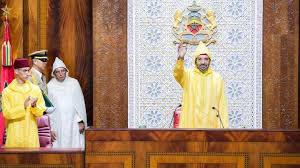King Mohammed VI has hailed the positive momentum in international support for the Kingdom’s sovereignty over the Sahara and the autonomy plan proposed to settle the artificial conflict.
In a speech on the opening of the Fall session of the parliament, King Mohammed VI recalled that now two permanent members of the UN security council back Morocco’s sovereignty over its southern provinces: The United States and France.
King Mohammed VI has welcomed the the growing support enjoyed by Morocco’s national cause, as evidenced by the clear stand expressed by France, and its support to Morocco’s sovereignty over its Sahara, saying this momentum confirms Morocco’s sovereignty over its territory and increases international support for the Autonomy Initiative.
In the speech that he devoted entirely to the Sahara issue, the Monarch recalled that he has repeatedly said that Morocco is bound to move from a management stage, to a stage in which it changes the situation, both domestically and at the external level, all dimensions considered.
“I have also called for a shift in our approach, from reacting to developments to taking the initiative and being decisive and proactive,” said the King, who was accompanied by Crown Prince Moulay El Hassan and Prince Moulay Rachid.
In his speech that was broadcast live on radio and television, the Monarch welcomed the results reached by the efforts, exerted with resolve and patience, using all the existing means to publicize Morocco’s just position, as well as its historical and legitimate rights regarding the Sahara, notwithstanding a challenging and complex international environment.
In this connection, he paid a special tribute to France, which now, he said “supports the sovereignty of the Kingdom over the entire territory of the Sahara. It also backs the Autonomy Initiative within the framework of Morocco’s territorial integrity as the sole basis for resolving this artificial regional conflict.”
“I wish to take this opportunity to offer, personally and on behalf of the Moroccan people, our most sincere thanks and to express our gratitude to France and to His Excellency President Emmanuel Macron, for this unequivocal support for the Sahara as a Moroccan territory,” King Mohammed VI stated, adding that “through this positive development, justice and legitimacy have been upheld, and so have Morocco’s historical rights, especially since this recognition emanates from a major country, which is a permanent member of the Security Council and an influential player on the global stage,” and which “is fully aware of the ins and outs of this regional conflict.”
The Monarch argued that this recognition also supports the efforts exerted at the United Nations level to lay the groundwork for a political process that would lead to a final settlement of this issue within the framework of Moroccan sovereignty.
Besides France’s position, which is part of the positive momentum characterizing the Moroccan Sahara issue, confirming Morocco’s sovereignty over its territory, and increasing international support for the Autonomy Initiative, the Monarch pointed out that Morocco has been able to secure the recognition of other influential countries, including another permanent member of the Security Council, namely the United States.
The King also recalled the stances of Arab and African sisterly nations, “which have been clearly and steadfastly backing the Kingdom’s territorial integrity, especially the countries that have opened consulates in Laayoun and Dakhla.”
In this respect, the King highlighted the growing support for the autonomy plan under Moroccan sovereignty, citing former colonial power Spain which considered the option as “the solution” to the Sahara issue.
“I wish to express my deep appreciation to all our friends and partners for supporting Morocco’s foremost cause,” said the King.
King Mohammed VI also thanked the countries that invest or have trade relations with the southern provinces, saying that in doing so they are contributing to the region’s social and economic development “thereby reinforcing the status of the southern provinces as a hub for interaction and exchange between Morocco and the rest of Africa.”
“This puts our southern provinces front and center in the strategic, continental initiatives that I have launched, such as the Morocco-Nigeria Gas Pipeline project, the African Atlantic countries initiative, and the initiative designed to enable African Sahel countries to have access to the Atlantic Ocean,” said the King
“Our achievements to bring this issue to a final close and the economic and social development witnessed in our southern provinces are the result of the solidarity and the efforts of all Moroccans in order to consolidate our national unity and preserve the nation’s territorial integrity,” the King said.
The King called for building on this positive momentum to “further mobilization and vigilance on the part of everyone” in order to keep consolidating Morocco’s position, to publicize its just cause, and to thwart maneuvers by its enemies.
“We need to explain the fundamental elements underpinning the Moroccan position to the few countries whose stances on the issue still go against the logic of law and history,” he said.
“We need to convince them through legal, political and historical evidence as well as spiritual arguments that confirm the legitimacy of the Sahara as a Moroccan territory,” the Monarch added.
In this respect, he urged all national institutions and bodies, as well as governmental, party and civic organizations to work together “to increase efficiency and ensure the effectiveness of their action.”
Party and parliamentary democracy should also work towards “securing wider recognition of the Sahara as a Moroccan territory, and in increasing support for the Autonomy Initiative as the only solution to this regional conflict,” he said.
The Monarch stated further that “Morocco will never waver in its position,” and that it “will remain open to its Maghreb and regional environment, thereby contributing to the achievement of joint development, and to the security and stability of the peoples in the region.”
